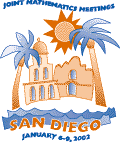|
 How the World
Sees Mathematicians, Sunday, 4:30 p.m.
6:00 p.m., organized by Allyn Jackson, AMS. In recent
years there has been a surge of popular interest in mathematics
and mathematicians, spurred by such works as Sylvia Nasar's acclaimed
biography of John Nash, A Beautiful Mind; David Auburn's
Pulitzer Prize- and Tony Award-winning play Proof; and Simon
Singh's book and BBC program about Andrew Wiles's proof of Fermat's
Last Theorem.
How the World
Sees Mathematicians, Sunday, 4:30 p.m.
6:00 p.m., organized by Allyn Jackson, AMS. In recent
years there has been a surge of popular interest in mathematics
and mathematicians, spurred by such works as Sylvia Nasar's acclaimed
biography of John Nash, A Beautiful Mind; David Auburn's
Pulitzer Prize- and Tony Award-winning play Proof; and Simon
Singh's book and BBC program about Andrew Wiles's proof of Fermat's
Last Theorem.
But consider also the recent study finding that British and American
schoolchildren believe "mathematicians are fat, scruffy and have
no friends" (London Times, January 3, 2001). Perceptions
of mathematicians may be changing, but stereotypes die hard.
How does the public perceive mathematicians? Are those perceptions
changing as a result of the increased popular interest in mathematics?
What more can be done to give the public a more realistic view of
mathematics and mathematicians?
A major motion picture based on A Beautiful Mind is scheduled
to be released three weeks before the Joint Mathematics Meetings,
providing an excellent occasion for a panel discussion on this topic.
Panelists include: Dave Bayer of Barnard College, who served
as the mathematics consultant for the movie A Beautiful Mind;
K. C. Cole, a science reporter for the Los Angeles Times
and author, most recently, of The Hole in the Universe: How Scientists
Peered over the Edge of Emptiness and Found Everything; and
Keith J. Devlin of Stanford University, prolific mathematics
popularizer and regular NPR commentator. This panel discussion is
sponsored by the AMS Committee on the Profession.
 Committee
on Education Presentation, Wednesday,
8:30 a.m.10:00 a.m., will feature a talk by Lee V.
Stiff, President, National Council of Teachers of Mathematics.
There will be a question and answer period following the talk.
Committee
on Education Presentation, Wednesday,
8:30 a.m.10:00 a.m., will feature a talk by Lee V.
Stiff, President, National Council of Teachers of Mathematics.
There will be a question and answer period following the talk.
 BELOW
BELOW
Using
the AMSREFS Package for LaTeX Bibliographies,
Monday, 1:00 p.m. to 2:00 p.m., presented by Michael Downes,
AMS. This new package for authors addresses a number of shortcomings
in the usual current methods of bibliography production that tend
to cause authors unnecessary extra work. By using this package and
submitting manuscripts electronically, your work will significantly
increase in the quality of the bibliography data for archival purposes.
The work required by AMS staff in processing your manuscript also
will be significantly reduced, resulting in faster production. This
presentation is oriented toward authors who are writing typical
research-level mathematics.
New Directions at the NSF,
Tuesday, 9:45 a.m. to 10:45 a.m. Panelists David Eisenbud
and Michael F. Singer, Mathematical Sciences Research Institute;
Douglas N. Arnold, Institute for Mathematics and Applications;
Mark L. Green, Institute for Pure and Applied Mathematics;
and Philippe Tondeur, NSF Division of Mathematical Sciences,
will describe the new NSERC-NSF Conference Center at Banff, Canada
(Banff International Research Station in the Mathematical Sciences)
as well as the new initiatives taken by the NSF Institutes and by
the DMS. The panel will be moderated by Tony F. Chan, UCLA.
Sponsored by the Committee on Meetings and Conferences.
Who Wants to Be a Mathematician,
Tuesday, 10:00 a.m. to 10:55 a.m., organized by Michael
A. Breen and Annette W. Emerson, AMS, and William
T. Butterworth, Barat College. Come watch ten of San Diego's
top high school students as they have the chance to compete for
cash and prizes by answering questions about mathematics. There's
no partial credit to agonize over, and the top prize is $2000. Contestants
can ask for help from the audience, so the more people in the audience
who know mathematics, the better it is for the contestants. You're
invited to come and take part in this educational and fun presentation.
How You Can Help Improve Elementary
School Mathematics, Tuesday, 3:15 p.m. to 5:30 p.m.,
organized by Deborah L. Ball and Heather Hill, University
of Michigan, Ann Arbor. The Developing Teachers' Knowledge for
Teaching Mathematics study seeks mathematicans to build our
understanding of the mathematics elementary teachers need to know
to teach. We invite you to complete a 45-minute questionnaire which
assesses mathematics knowledge for teaching. We are interested in
comparing how mathematicians and teachers respond to these items.
Your responses, as mathematicians, will allow us to better understand
how mathematics is known and used by different populations who use
it in their work. All responses will be confidential and anonymity
will be preserved in any discussion of the results of the survey.
To thank you for your time, you will receive a copy of the new National
Research Council report, Adding It Up: How Children Learn Mathematics.
See program for detailed information
on AMS Sessions and Invited Addresses.
12/19/01 13:25
POP
|
